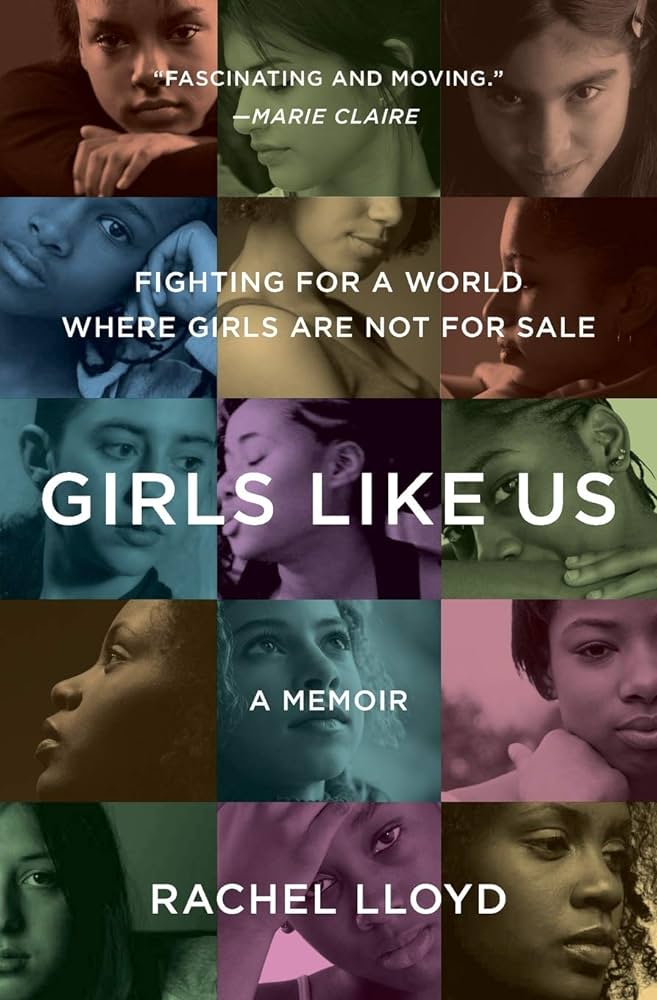Sometimes, you read a book and you struggle to put it down because it’s so good. Other times you read a book that is so powerful yet such a difficult read, you put it down because you need to process what you’ve just read. This book was one of the latter.

‘Girls Like Us’ written by Rachel Lloyd tells of her survivor story and escape from the commercial sex industry and how she founded GEMS, New York City’s Girls Education and Mentoring Service that helps other young girls escape “the life.” When I say “the life” I refer to the trafficking industry which Hope for Justice predicts is $245b dollar industry every year. Every. Year. For most, it is a difficult industry to leave a lot of it to do with fear and intimidation leading to abuse and sometimes even death.
We had to read this book during my Anti-trafficking DTS in Los Angeles and it was heartbreaking and powerful. Below are questions that I had to answer for a book report we had to do that explores what I think girls/women need in order to move out of “the life”, what I learned from reading this book and what stood out most to me and why.
1. What do you think girls/women need in order to move out of ‘the life’?
I think girls/women in “the life” need a few key things to help them move out of it. For one, a good support system. Early on in the book on page 21 when Rachel is talking with the girls and the girls are responding to her story one girl makes a comment saying that all of these things happened for a reason. She says to Rachel that everything she went through lets them know that they’re “not alone.” There was purpose to the pain and I love how God’s always working things for good, even the most painful things. On page 54 Rachel claims “it’s better to teach them how to be resilient, how to create a family from the people around them who are able to love them in a healthy way.” What they need are people to genuinely love them, without judgement, unconditionally, who will choose them and choose to be there for them every time.
“I realised that one of the most important roles that I could play was to give a face to the issue, to humanise survivors and challenge people’s preconceived notions about them.”
Rachel Lloyd
They need someone to raise them up and advocate for them. What Rachel stood up for despite the challenges and imposter syndrome was that the issue needed a “face.” For example on page 241 it says “I realised that one of the most important roles that I could play was to give a face to the issue, to humanise survivors and challenge people’s preconceived notions about them.” Like Jesus, our advocate when the enemy tries to hold up our sin before God and say look what they’ve done in the past in order to make a case against us, these girls need someone to stand up for them when they feel like they can’t stand up for themselves. It’s also interesting that on page 157 Rachel writes about how a girl was “rarely exposed to a different perspective or at least to one that could help her.” So what they need is someone to simply care for them, someone to extend a helping hand and someone that will root for them in places like the courtroom when all odds are against them.
They also need these things consistently. I was really struck by a quote on page 25 that said “The girls need to try (to leave) multiple times without having someone give up on them.” Where the example of inconsistency is their normality, someone needs to be a recurring presence, for example, this is something that their pimp might also represent, their pimps presence is a constant and they attach a bond to them so there needs to be that ability to replace that bond with a healthier example.
They also need safe spaces to process! A place where they are free and accepted to be vulnerable. I was really taken aback by the quote that said “the fear often keeps her from running away. The shame can keep her from reaching out.” To be vulnerable can be quite a scary thing so the ability to have a safe space to process with no fear of judgement or shame is definitely needed. They also need a space to unlearn the lies and rebuild a healthy mindset. On page 202 it says “just as ex-cult members need reprogramming after leaving an abusive cult, there’s a lot of unlearning to do once girls escape the commercial sex industry. Their attitudes and core beliefs have to be reframed.”
“Many girls, even in this country are growing up in a society that does not provide real and viable opportunities for the future. At the same time, they’re living in a culture that increasingly teaches them that their worth and value are defined by their sexuality.”
Rachel Lloyd
For them, a future needs to be something they can strive for, they need to be able to see that there are opportunities for the future. I found it interesting that the girls didn’t have much concept of things like saving money which makes sense as money was earned and also quickly taken away from them too. Maybe this means having a systemic change in society about the perception of the girls, calling it like it is, how a majority of them have been taken at a young age and had the opportunities taken away from them. For them the perception is this “Many girls, even in this country are growing up in a society that does not provide real and viable opportunities for the future. At the same time, they’re living in a culture that increasingly teaches them that their worth and value are defined by their sexuality” (page 82). So in order to combat this, more awareness needs to be raised thus leading to more opportunities and then more doors opening. On page 172 it says that what makes the most difference is that if the girl/woman believes that she has “options, resources, somewhere to go, and the support she’ll need once she’s out, without that glimmer of hope, whether it comes in the form of family, a program like GEMS, or a church community…it’s unlikely that she’ll leave [the life].
After reading this book I was left to reflect on my own privilege as a British national with an “education”. After witnessing what I’ve seen and the stories I’ve heard it’s also important to remind myself that I also have a voice and a chance to speak up when I see injustice. Recognising that this isn’t something I’ve personally been through doesn’t mean I can’t still speak up and advocate for survivors. Oftentimes I don’t always recognise my privilege as an advantage whereas these girls are learning to find their voice, their roar “Ultimately as girls begin to find their own voice, power and strength they can begin to envision a productive and exciting future” (page 253).
“The human need for appropriate, unconditional love to help in the healing process cannot be ignored.”
Rachel Lloyd
Finally, they need a real encounter with the real Jesus. It made my heart break when I read that some of the girls who had been trafficked said that “the Bible just makes me feel guilty anyway.” When I read that, in a way, my heart broke for her because it doesn’t sound like she had a true encounter with Jesus. Guilt and condemnation is not from Him and sometimes we, as part of the Church and an individuals are the only “Bible” these women will read and sometimes we don’t represent Him properly. On page 230 it says, “the human need for appropriate, unconditional love to help in the healing process cannot be ignored.” They need to experience unconditional love and have it demonstrated in a way that truly reflects Jesus’ heart for them.
2. What was something you learned after reading this book? Explain
I was reminded of the realisation that I will never be able to truly, fully relate to what these girls/women will experience. I hope to God that I or anyone I know don’t have to live the experiences Rachel talks about in her books. I haven’t experienced physical abuse or torture like they have. And that reference to a “luv luv life” is probably the only thing I’ll be able to relate to and I’m learning that that’s ok. There are definitely things I’ll be able to relate to in terms of grief and sadness but not the whole picture. What I can be though, is someone that will listen, advocate, cheer on, encourage and show up for. I’m coming to terms with the fact that I don’t necessarily need to have walked their exact same path but what I do know is that I’ll be able to show them the truth of Jesus and I need to learn that that is enough.
3. What stood out to you the most and why?
I think what stood out to me the most was how graphic it was. Rachel didn’t hold back and I don’t think she should’ve. Their stories need to be told, however graphic it is because that’s the harsh reality of topic and it needs to be conveyed. Although I found aspects quite shocking I think it adds to the overall story. This book really broke a worldview that women decided this for their lives, you learn that they most certainly do not and they are forced into it majority of the time and held there with fear and intimidation. It’s shocking because this topic is so heartbreaking and I hope that one day it will not exist at all. It felt quite overwhelming to read at first and to think that these girls were teenagers and speak so freely of rape, being beaten up and being mentally abused, it’s no wonder that they had all their walls up at the beginning. But as you read on, you understand it more.
For those who would like to read this book you can buy it from Amazon here. There is a content trigger warning that I must remind you about in reference to abuse and modern slavery.





